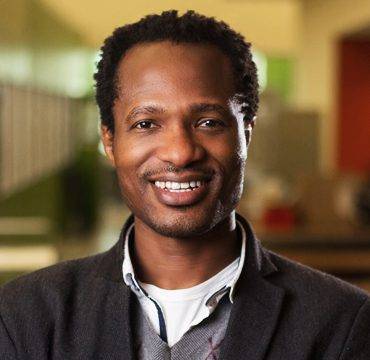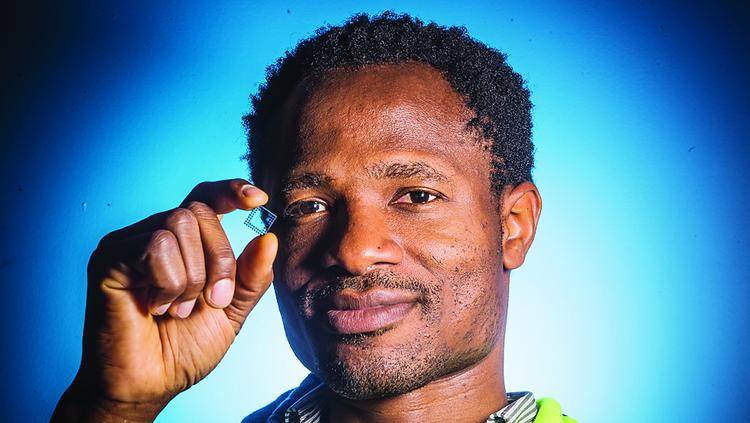Where Man Meets Machine – A Nigerian Techie Is Building A Computer Out Of Actual Brains!

Now, here’s another entry for the much-coveted “Next Level Sh*t” category; there’s a Nigerian tech entrepreneur who is building a computer out of actual brains! Yes, you read that right – actual brains. And for once, this is not the stuff of science fiction.
When Oshiorenoya Agabi; a Nigerian neurotechnology entrepreneur who runs a Silicon Valley-based startup, took to the stage at the 2017 TEDGlobal Conference in Arusha, Tanzania, he left some 700 researchers, innovators, and academics from all over the world in awe after unveiling some major breakthroughs in an area of study that can only be described as “Next-Gen Tech.”

Source: gg2018.nef.org
According to the Nigerian tech entrepreneur, some new grounds had been broken by his startup, Koniku, in the exploration of a new frontier – a nascent field that has been the subject of scientific interest for quite some time – one that has something to do with fusing electronics with biological systems.
Agabi has masterminded the creation of a device that merges syenthetic neurobiology with silicon. The modem-sized device, christened Koniku Kore, is essentially a computer unlike any other furnished with an impeccable ability to become aware of surroundings, sniff out explosives, and even detect malignant tumours.

With names like Google, Facebook, Microsoft, Tesla, and IBM dominating most of the usual conversations around Artificial Intelligence (AI) and Deep Learning networks, the bulk of the most recent buzz have now shifted to the development of “human-esque” systems that have the ability to learn, recognize patterns, and make decisions with greater speed and accuracy.
Such efforts, which have been widely touted as the next steps in the evolution of AI, have at their core, the development of systems that mimic actual thought patterns in living systems. And the foundations for Agabi’s work was laid along the lines that these “brain-like” processors are missing an essential ingredient; actual brains.
The logic for the project is pretty much based on a healthy premise – if we want to create an electronic system that thinks and learns like a biological entity, we might as well incorporate some elements of biological systems into the said electronic system to create a superior, life-like device that is more or less furnished with what could be described as the best of both worlds i.e both man and machine.
It is on that note that Agabi and the rest of the team at Koniku have made significant headway in a procedure which involves borrowing the actual material of brains for the creation of very powerful microprocessors that have the capacity to do a lot more than standard silicon chips.

In efforts geared towards taking AI to the next level, the folks at Koniku are getting the hang of a rather delicate practice which involves fusing lab-grown sensory nerve cells (biological neurons) onto computer chips, with the aim of building computers that are a lot more “life-like.”
“We merged synthetic neurobiology with traditional silicon technology with the goal of fixing urgent real-world problems,” Agabi says. If all goes according to plan, the Koniku Kore will be the first to successfully fuse live neurons from mice stem cells onto a silicon chip – a seamless convergence of biology and electronics.
While computers undoubtedly do a better job of solving complex mathematical problems, as well as processing large volumes of data in little or no time, the human brain still holds its own when it comes to some special cognitive functions.
A valid case in point could be cited in something as rudimentary as the sense of smell. For all the talk of machine power, living systems still do a better job of identifying different kinds of smell and training a computer to do the same would require some crazy amounts of computational power and energy. And that’s just one instance out of many.
You could think of it this way – digital supercomputers are fast and reliable but inherently dumb, whereas, biological neurons are slow yet smart. And all these are attempts at making up for the flaws of both systems by combining them.
In view of that, Agabi is looking to sort of reverse-engineer biology – which already features some special functions – with a fraction of the power it would take a silicon-based processor. That way, instead of merely copying the brain as most deep learning networks tend to do, the technology would actually function as an actual brain would.

As per the smell function, the Koniku Kore could act as an amalgam of living neurons and silicon, with olfactory capabilities. That is, a machine with biological sensors that can pick out and identify smells.
And it doesn’t stop at the smell function. The same neurons can be tasked with carrying out other functions. As Agabi says; “You can give the neurons instructions about what to do – in our case, we tell it to provide a receptor that can detect explosives.”
The Nigerian techie believes that the technology could be the ideal solution to some of the world’s security challenges, including terrorism, especially at some the world’s busiest terminals and commercial hotspots.
As he told CNN, “Explosives have particles and smells coming off the individual and with our device you can tell, without requiring line of sight or contact, you can scan them at the time at a place of your own choosing and you can get into an aircraft and go about your business.”
The Koniku Kore could be the key to eliminating the endless queues that some of the world’s busiest airports are notorious for. The technology could revolutionize airport security.
By placing such high-tech devices at strategic points, only individuals bearing prohibited items would be flagged and apprehended. That way, we could finally enjoy the ideal scenario where one could catch a flight by simply walking from car to airplane without having to go through several stops and rigorous searches.
Beyond its security applications, Agabi also envisages a future where such a device could be used to detect ailments in pretty much the same way some sniff dogs can detect cancerous cells through smells.
The Koniku Kore could be used to detect illness by sensing markers of a disease in the air molecules that a suspected patient gives off. For cases of cancer wherein early detection is key, such technology could prove quite useful.
“In the same way that a dog is able to detect if someone has prostate cancer, the real question we ask is ‘how does a dog do it?’ We can clone that process on our chip, so yes in the same way that a dog can detect diseases or explosives at an airport, it’s a sensory system, that is essentially what we recreate in our chip,” Agabi says.

According to the Nigerian who founded the startup in 2015, Koniku (which translates to “Immortal” in the Nigerian Yoruba language) has been able to raise funds to the tune of USD 8 Mn since its launch. The startup is believed to have also struck a number of profit-making deals within the security industry.
The Nigerian tech entrepreneur is strongly committed to building electronic systems that are driven by biological brains made out of synthetic biological neurons.
He is also quite aware of the ethical concerns and implications trailing the creation of humanoid devices, reiterating that a bigger disservice would be done to mankind by choosing not to deploy the most effective resources in tackling some of society’s lingering problems, especially those ones that have proved immune to current efforts.
Born and raised in Lagos, Nigeria, Oshiorenoya Agabi obtained a Bachelor degree in Physics from the prestigious University of Lagos (UNILAG). That was followed by further studies in Sweden and Switzerland where he honed his skills in advanced physics and neuroscience.
By leveraging years of teaching machines to learn, as well as recent advances in the study of the brain’s mechanics, Agabi and the team at Koniku might just be on the cusp of the next big thing in tech.
We’re talking about actual computers and devices built with actual living, learning processors. Now, if that doesn’t scream “next level,” I wonder what does.
Featured Image Courtesy: Youtube